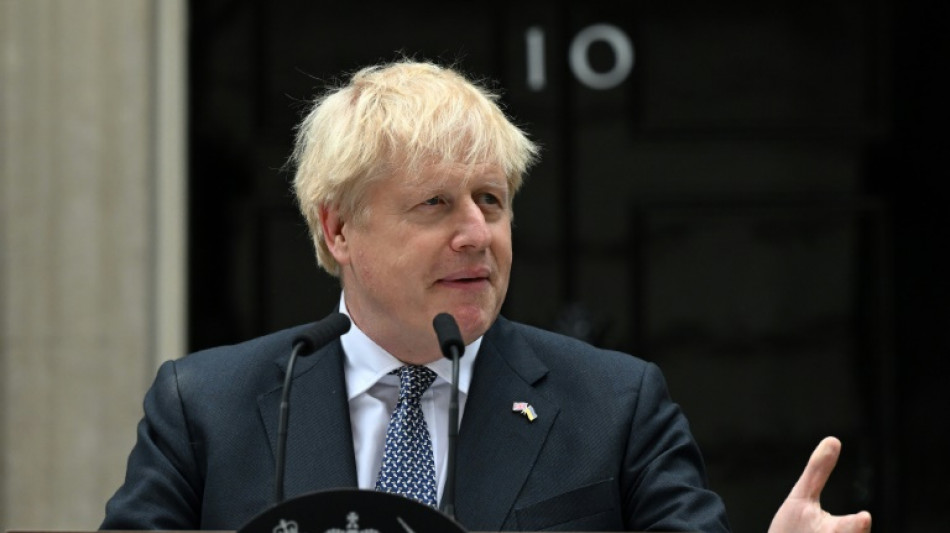

Would-be Johnson successors ready for race to become British PM
Would-be successors to scandal-ridden British Prime Minister Boris Johnson were readying Friday for what will be a prolonged battle, the day after an extraordinary exodus of Conservative ministers brought about their leader's downfall.
Johnson resigned on Thursday as Tory leader, acknowledging that it was "clearly the will of the parliamentary Conservative party that there should be a new leader of that party, and therefore a new prime minister".
The leadership election is expected to take place over the coming months, and the victor will replace Johnson by the party's annual conference in early October.
Defence minister Ben Wallace and Rishi Sunak -- whose resignation as finance minister on Tuesday set off the chain of exits -- were among the early frontrunners to take over, a YouGov survey of Tory members suggested.
Foreign Secretary Liz Truss, another potential contender, cut short a trip to Indonesia for a G20 meeting to fly back.
So far Conservative MP Tom Tugendhat is the only person to officially announce their campaign, though Attorney General Suella Braverman and Brexiteer Steve Baker have both signalled interest.
In Johnson's unrepentant resignation speech on Thursday he said he would stay on until his successor is found.
But calls are building for him to leave immediately, and for an acting leader to head the world's fifth-largest economy.
Polling suggested most Britons favour his rapid exit, as claims surfaced that Johnson is only hanging on to enjoy a wedding party with wife Carrie at his government-funded country retreat.
"Clinging on for one last party," blared the leftwing tabloid Daily Mirror on Friday morning, adding a pointed jab referencing a Brexit slogan: "Leave means leave, Boris".
But on the other side of the political spectrum, the Daily Mail's front page asked "What the hell have they done?" -- characterising Johnson as "cast out by a party in the grip of collective hysteria".
- 'Best job' -
Johnson's tumultuous three years in office were defined by Brexit, the Covid-19 pandemic and non-stop controversy about his reputation for mendacity.
On Thursday, the 58-year-old said he was "sad... to be giving up the best job in the world", justifying his refusal initially to surrender to his "herd" of Tory critics by claiming a personal mandate in the Brexit-dominated general election of December 2019.
Even while eyeing the exit, Johnson sought to steady the ship, making several appointments to replace departed cabinet members.
They included Greg Clark, an arch "remainer" opposed to Britain's divorce from the European Union, which Johnson had championed.
The inexperienced Shailesh Vara was put in charge of Northern Ireland, with the government locked in battle with Brussels over post-Brexit trading rules for the tense territory.
Irish premier Micheal Martin said Johnson's exit was a chance to reset "strained and challenged" relations.
Convening the new-look cabinet after his resignation speech, Johnson confirmed his lame-duck status by saying "major fiscal decisions should be left for the next prime minister", according to Downing Street.
Sunak and health secretary Sajid Javid started the ministerial exodus when they quit late Tuesday, after Johnson apologised for his February appointment of a senior Conservative MP to a prominent role in parliament.
Chris Pincher resigned as deputy chief whip last week following accusations he had drunkenly groped two men.
Downing Street officials eventually conceded that Johnson had known about other allegations against Pincher back in 2019, and many ministers recoiled at having to defend the leader yet again.
As late as Wednesday night, Johnson had been defiantly clinging to power despite a wave of more than 50 government resignations.
But a fresh round of high-profile departures early Thursday, and warnings of a second no-confidence vote next week by Tory MPs, tipped the balance.
- 'Arrogant and delusional' -
Johnson triumphed in 2019 with a vow to "get Brexit done" following Britain's shock referendum decision three years prior. But for many, the populist, convention-defying leader had outstayed his welcome.
The Conservative infighting erupted at a time when millions of Britons are battling the worst slump in living standards since the 1950s, fuelled by rocketing energy prices on the back of the war in Ukraine.
Johnson's popularity had already slumped over a series of lockdown-breaking parties in Downing Street, which saw him become the first prime minister to receive a police fine.
While Johnson ran a successful coronavirus vaccine campaign, the former journalist also oversaw one of Europe's worst death tolls, and nearly died himself from Covid in April 2020.
"Whilst Johnson will move on to a life of writing newspaper columns and being paid eye-watering amounts to give after-dinner speeches, there will be no moving on for the families like mine that have been ripped apart by his actions," he said.
W.P.Walsh--NG



